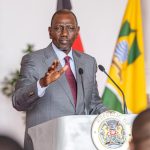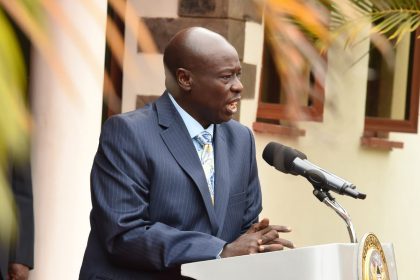The Kenya National Qualifications Authority (KNQA) is seeking a framework to function as an independent Commission.
According to the Authority’s Strategic Plan 2023-2027 set to be unveiled on Friday, by Education Cabinet Secretary Ezekiel Machogu, the move will stipulate clear guidelines and structures that ensure KNQA’s ability to operate independently, promoting impartial decision-making and accountability.
The mandate of the Authority cuts across Basic, Technical Vocational Education and Training (TVET) and University sub-sectors which entails development and implementation of the Kenya National Qualifications Framework.
This involves inter alia, establishing standards for recognizing qualifications obtained in Kenya and outside Kenya; developing a system of competence, life-long learning and attainment of national qualifications; aligning the qualifications obtained in Kenya with global benchmarks in order to promote national and trans-national mobility of workers; strengthening the national quality assurance systems for national qualifications; and facilitating mobility and progression within education, training and career paths.
The Strategic Plan also outlines measures that the Authority will adopt in resource mobilization strategies among them advocating for increased annual funding from the exchequer to meet the huge mandate bestowed on the Authority.
The Authority has projected allocation of Kshs.1,555 million against a requirement of Kshs.1,927.28 million resulting in a resource gap of Kshs.372.28 million.
For the Authority to achieve its mission and vision, this strategic plan has identified three strategic issues that include; quality and relevance; access, equity and inclusivity; governance and accountability.
The Plan notes that improving access, equity and inclusivity is a critical component of this plan and therefore this will be achieved through diverse pathways of qualification frameworks. This strategic issue will be implemented through Mobility and Progression of Learners as the key result area.
Formulating national policies and standards on national qualifications is the mandate of KNQA, ensuring that by implementing robust frameworks andsystems, the Authority upholds the highest standards of quality and relevance in education and training.
KNQA will execute this mandate through three key result areas: Research and policies on national qualifications; Registration of Qualifications Awarding Institutions (QAIs) and qualifications; and National Qualifications Database.
“The Authority has identified three strategic goals in itsplan to strengthen the nation’s qualification framework. The goals are Improving the Quality and Relevance of Qualifications to align with industry and global standards, Enhancing Access, Equity, and Inclusivity within the system, and fortifying Governance and Accountability mechanisms. Through these objectives, the Authority aims to establish a robust qualification framework that fosters a skilled workforce, drives economic growth, and promotes social development,” reads the Strategic Plan.
On improving the Quality and Relevance of Qualifications, the strategic goal will be realised through harmonisation of policies on national Qualifications, registration of QAIs and qualifications, and strengthening of Kenya National Qualifications Database.
On access, equity and inclusivity, the plan aims to improve Access, Equity and Inclusivity to education and training by enhancing mobility and progression of learners through diverse pathways. It is informed by the Key result area on mobility and progression of Learners.
KNQA contributes to the Fourth Medium-Term Plan (MTP)across various sectors. In the field of education and training, KNQA aligns with the plan by reviewing the framework to accommodate quality qualifications in emerging education reforms Competency Based Education (CBE), Competency-Based Education Training (CBET) and Micro Credential.
“Additionally, KNQA collaborates with sports experts to register quality qualifications in different sports, tapping into the talents of the youth and strengthening the accreditation system. In agriculture and livestock, KNQA collaborates with experts to develop relevant qualifications that maximize production and comply with the framework requirement . said Director General Dr. Alice Kande.
“Furthermore, KNQA works with industries to develop market driven qualifications, ensuring a skilled and adaptable workforce for sustainable economic development in various sectors. This focus on supporting education reforms, sports development and agricultural productive and employment creations is in line with the Fourth MTP,” she added.
The Strategic Plan further indicates that during the period under review, a total of 1,382 out of 6,441 qualifications were registered in KNQF.
The registration ensured that all educational and professional qualifications meet the required standards, providing a clear and credible framework for learners.
The Authority registered 31 Qualifications Awarding Institutions in the KNQF out of 122 mapped institutions.
Additionally, a total of 100,532 learners were registered in the National Learners Records Database while a total of 11,454 Qualifications both from local and foreign institutions were validated and aligned to KNQF during the plan period.












